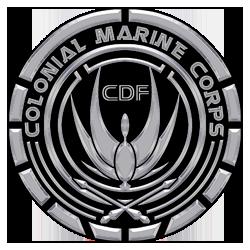|

Unit Profile
Colonial Marine Fleet Antiterrorism Security Team (FAST) Company
Dedicated, armed, combat-trained cadre.
Task organized and equipped to perform security missions of short duration.
Augment installation security when the threat condition has been elevated beyond the capability of the permanent security
force.
Train installation security forces in antiterrorism and weapons marksmanship.
Assist the base security officer in the preparation of base defense and other security plans.
Requested by combatant and fleet commanders-in-chief.
Deploy only upon approval of the Chief of Naval Operations.
Established after the 1st cylon war, FAST Company is comprised of 500+ Marines equipped to perform security missions as
directed by the Chief of Naval Operations. FAST Company Marines augment installation security when a threat condition is elevated
beyond the ability of resident and auxiliary security forces. They are not designed to provide a permanent security force
for the installation.
FAST Company is primarily designed to conduct defensive combat operations, military security operations, and rear area
security operations. It also can be tailored for specific tasks from the Chief of Naval Operations. They also ensure nuclear
material on colonial vessels is not compromised when the vessels are docked.
Because they are spread across the colonies, FAST Marines can be sent anywhere within 24 hours. The length of their stay
is determined by the mission, Colonial Marine officials said, but the average FAST Marine spent about 150 days on assignment
per year
"If you like to deploy and go out with real bullets, this is the job for you,"
While the companies advertise little in the way of offense, about a dozen Marines from each platoon are typically trained
in close-quarters combat, Marine officials said.
But putting those skills to use often means the defensive mission has failed.
"We're like a mobile guard force," the FAST Marine said. "We go to a high-threat area and set up security,
but we have to be ready for all types of situations. You never know what's going to happen out there."
Each deployed platoon supports the fleet commander, a Navy admiral, in that area.
Additionally, one platoon is always on alert, Marine officials said, for the possibility of being called to action by
the commander in chief of the Colonial Fleet.
|
